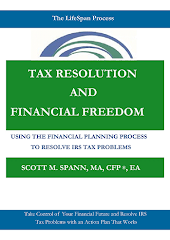The definition of insanity may be doing the same things over and over again and expecting different results. I think the key defining element of seeking financial change (and eliminating insane amounts of debt) is doing the right things over and over again and actually getting positive results. Spending with a plan is the right thing to do, and it must be done over and over again.
The creation of a personal spending plan is one of the most important steps of the tax resolution process. A personal spending plan is also the foundation for achieving financial freedom. On the surface a spending plan or budget is extremely basic. Most people do not even have a simple budget much less a spending plan to guide their financial decisions. The purpose of this tax resolution step is to create a personal spending plan that will help you make sure that your money is working for you the best ways possible. Spending plans are also needed to resolve your tax debt and reach your other life planning goals.
A budget is generally defined as:
a) an itemized summary of estimated or intended expenditures for a given period along with proposals for financing them,
b) a systematic plan for the expenditure of a usually fixed resource, such as money or time, during a given period, and
c) the total sum of money allocated for a particular purpose or period of time.
When used as a verb the word budget means to plan in advance the expenditure of something. These definitions each focus on the action of planning. Budgeting is defined as estimated projection of the amount of certain expenses. During the tax resolution process you should use the word budget as a verb and take action. Tell your money where you want it to go rather than trying to figure out where it all went or worse, spending more than you have available and relying on credit cards and debt to get you through the month.
Unfortunately, most people approach the budgeting process the wrong way and do things backwards. They use a legal pad, spreadsheet or budgeting software and track where spending occurred across various categories (food, utilities, credit card bills, etc.). This is a great way to see where your money went during the previous month. But it is a horrible way to plan where your money will go in the future. During the previous step we analyzed where your money has been going in the past. Going forward, you should use the information gathered during the cash flow analysis to create a spending plan or budget.
The budgeting process is often misunderstood because it is typically viewed in a negative manner by the people who need one the most. We have discussed at length how many individuals in debt display problematic financial behaviors. One of the biggest problem behaviors is trying to manage personal finances without a plan. The lack of a personal spending plan or budget is common in the majority of people with tax problems. Many people are resistant to change when it comes to budgeting. Some tax resolution clients view a budget as a form of constraint that inhibits freedom. This is ironic because a personal spending plan will actually lead to financial freedom if used consistently.
Every single household spending plan is unique and each person will be presented with his or own set of challenges. Do not expect your personal spending plan to work perfectly the first time around. It may take a few months to figure this process out. This is normal. Whatever happens on a month to month basis, DO NOT QUIT and NEVER allow frustration to get in your way. Remember that the LifeSpan Process of Tax Resolution and Financial Freedom requires you to take action to replace negative financial behaviors with positive alternatives. The old way of doing things got you into this mess. Replace the old way with a new and improved way of handling your personal finances.
Tuesday, September 22, 2009
Creating a Personal Spending Plan
Labels: tax resolution, financial plan, tax debt
budget,
spending plan,
tax debt,
tax resolution
Monday, September 14, 2009
How Does a Personal Spending Plan Work?
A personal spending plan is a written plan to guide your spending habits and provide you with important direction for your money. Operating without a budget or personal spending plan can put you on the fast track to tax problems and debt while giving you a strong sense of feeling completely out of control financially. Following through with the budgeting process and sticking with a personal spending plan will help you assume control of your finances and will empower you to make smart financial decisions.
You cannot eliminate your tax and financial problems without a spending plan. You will not achieve financial freedom with a savings and investment plan. A personal spending plan will help you resolve your tax problems. Subsequently it will allow you to reach financial freedom by maximizing your ability to pay off your tax debt as quickly as possible and then save or invest as much as possible for your life planning goals.
Be prepared for everyone around you to think you are going insane when they see you are implementing a spending plan. Friends and family may act confused or completely freaked out by the fact that you have seen the light and are now operating on a budget. Most people just do not get it. They are probably spending without a clue themselves. That is why most Americans are in debt. It is important to realize this in advance because you should be prepared to explain to your friends and family why you are choosing to manage your money in a more effective manner. There is no need to be embarrassed or ashamed by the fact that you actually have the courage to say enough is enough- I am taking control of my life!
Most budgets fail because they lack purpose. During the tax resolution and financial freedom process your purpose is clear. Eliminate the tax problem, get out of debt, and focus on more important financial and life planning issues. When you create and stick with a personal spending plan never lose sight of the main purpose of following a budget in the first place- tax and financial freedom.
You cannot eliminate your tax and financial problems without a spending plan. You will not achieve financial freedom with a savings and investment plan. A personal spending plan will help you resolve your tax problems. Subsequently it will allow you to reach financial freedom by maximizing your ability to pay off your tax debt as quickly as possible and then save or invest as much as possible for your life planning goals.
Be prepared for everyone around you to think you are going insane when they see you are implementing a spending plan. Friends and family may act confused or completely freaked out by the fact that you have seen the light and are now operating on a budget. Most people just do not get it. They are probably spending without a clue themselves. That is why most Americans are in debt. It is important to realize this in advance because you should be prepared to explain to your friends and family why you are choosing to manage your money in a more effective manner. There is no need to be embarrassed or ashamed by the fact that you actually have the courage to say enough is enough- I am taking control of my life!
Most budgets fail because they lack purpose. During the tax resolution and financial freedom process your purpose is clear. Eliminate the tax problem, get out of debt, and focus on more important financial and life planning issues. When you create and stick with a personal spending plan never lose sight of the main purpose of following a budget in the first place- tax and financial freedom.
Tuesday, September 1, 2009
Tax Resolution and Financial Planning

What role does financial planning play during the tax resolution process? Financial planning is about taking control of your finances and is often defined as the process of meeting life goals through the proper management of your money. The planning process helps people make smart decisions about money and prepare for the demands of the future. More importantly, financial planning is about a better now. Some obvious demands are life's major events: getting an education, buying a home, retiring, providing for your children and even their children. Financial planning also concentrates on day to day concerns such as organizing your finances and preparing for the inevitable surprises that occur in life.
So, how does the financial planning process work when a financial crisis related to a tax problem occurs? Tax resolution is a financial planning challenge that is just as much about replacing ineffective financial behavior patterns of financial decision making with more positive ways of managing money and paying taxes as it is getting rid of the tax problem itself. Therefore, tax resolution planning is a natural fit with the financial planning process.
Subscribe to:
Posts (Atom)




